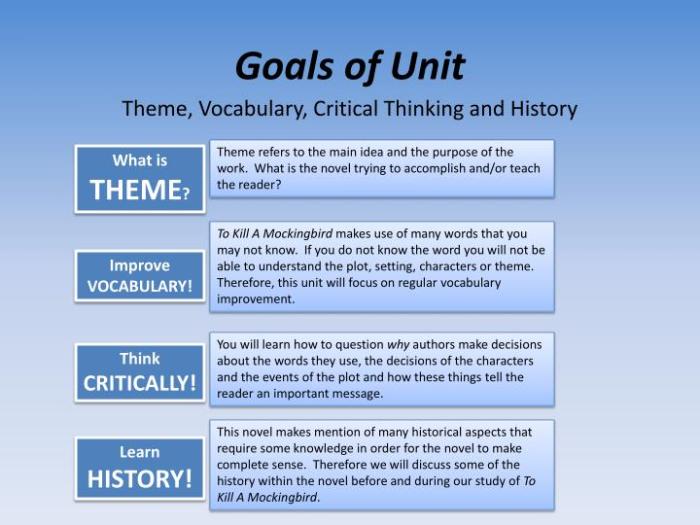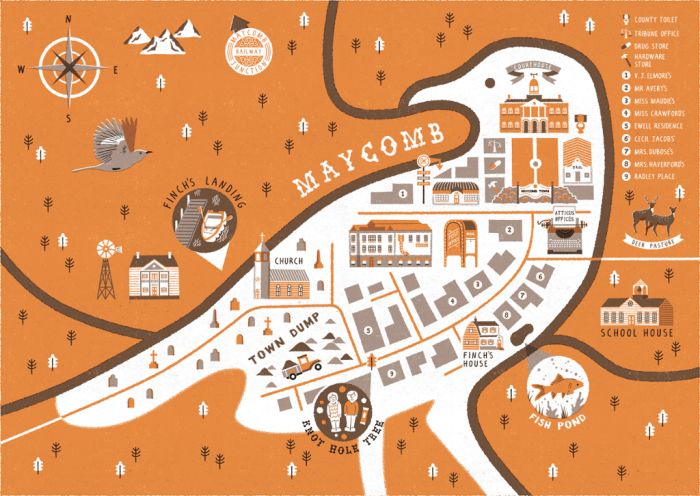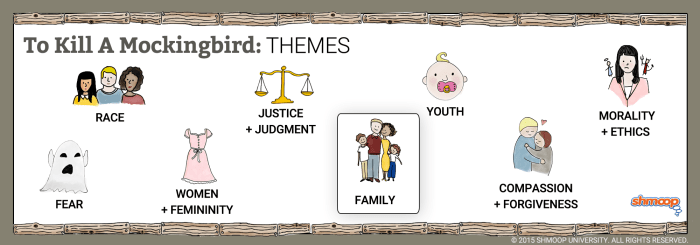Important events in to kill a mockingbird – In Harper Lee’s literary masterpiece, “To Kill a Mockingbird,” pivotal events unfold, shaping the novel’s profound exploration of racial injustice, innocence, and the complexities of human nature. This discussion delves into these key moments, revealing their transformative impact on the characters and the enduring themes of the novel.
The trial of Tom Robinson, the ostracism of Boo Radley, the symbolism of the mockingbird, Scout’s journey of self-discovery, and Atticus Finch’s unwavering moral compass serve as cornerstones of the narrative, driving the plot and illuminating the novel’s timeless message.
Tom Robinson’s Trial
Tom Robinson’s trial serves as a pivotal event in the novel, exposing the pervasive racial prejudice and injustice prevalent in the society of Maycomb County. The trial is a microcosm of the larger racial tensions that exist within the community, highlighting the deep-seated racism and inequality that permeate the justice system.
Racial Prejudice and Injustice, Important events in to kill a mockingbird
- The trial is fundamentally flawed by racial bias, with the all-white jury swiftly convicting Robinson despite overwhelming evidence of his innocence.
- The prosecutor, Bob Ewell, exploits racial stereotypes and appeals to the jury’s prejudices to secure a guilty verdict.
- The community’s unwavering belief in white supremacy influences the outcome of the trial, overriding any sense of fairness or justice.
Flaws in the Justice System
- The trial reveals the systemic failures of the justice system, which is designed to protect the privileged and oppress the marginalized.
- The lack of due process and the disregard for Robinson’s rights as a defendant expose the shortcomings of a system that is not impartial.
- The verdict underscores the fragility of justice in a society divided by racial prejudice and the ease with which innocent individuals can be unjustly condemned.
Boo Radley’s Emergence

Boo Radley undergoes a significant transformation throughout the novel, emerging from his self-imposed isolation to become a symbol of hope and redemption. His initial isolation stems from a combination of societal prejudice and his own fears.
Reasons for Boo’s Isolation
- Boo’s disfigurement and the rumors surrounding him foster fear and prejudice within the community, leading to his social isolation.
- His father’s strict upbringing and the townspeople’s judgment contribute to his self-imposed confinement.
- Boo’s fear of the outside world and his desire to protect himself from further ridicule and harm motivate his reclusive behavior.
Impact of Boo’s Friendship
- Boo’s friendship with Scout and Jem challenges their preconceived notions and fosters empathy and compassion.
- His acts of kindness and courage, such as saving the children from Bob Ewell, reveal his true nature and redeem him in the eyes of the community.
- Boo’s presence serves as a reminder that even the most isolated and misunderstood individuals can possess goodness and deserve a chance at redemption.
The Mockingbird Symbolism

The mockingbird, a symbol of innocence and vulnerability, is central to the novel’s themes. It represents the senseless destruction of the innocent and the consequences of harming those who are defenseless.
Significance of the Mockingbird
- The mockingbird is a symbol of the innocent victims of society, such as Tom Robinson and Boo Radley, who are unjustly targeted and harmed.
- It represents the beauty and fragility of life, and the importance of protecting the vulnerable from those who would do them harm.
- The destruction of the mockingbird symbolizes the loss of innocence and the consequences of societal injustice.
Mockingbird Motif
- The novel repeatedly emphasizes the importance of not harming mockingbirds, as they bring joy and harm no one.
- The children’s understanding of this principle reflects their developing sense of empathy and justice.
- The destruction of the mockingbird by Bob Ewell parallels the destruction of Tom Robinson’s life and the loss of justice in Maycomb.
Scout’s Growth and Perspective
Scout undergoes a significant journey of growth and self-discovery throughout the novel. Her experiences shape her understanding of the world and her place in it, and her perspective evolves as she matures.
Journey of Growth
- Scout’s initial naivety and childish beliefs are gradually replaced by a deeper understanding of the complexities of human nature and society.
- Her experiences with Tom Robinson’s trial and Boo Radley’s kindness teach her about prejudice, injustice, and the importance of compassion.
- Scout’s journey is one of self-discovery and the development of her own moral compass.
Evolving Perspective
- Scout’s perspective on the world changes as she witnesses the racial prejudice and injustice prevalent in Maycomb.
- She learns to question societal norms and to challenge the assumptions that she has been taught.
- Scout’s growing understanding of the world helps her to develop a strong sense of empathy and a commitment to justice.
Atticus Finch’s Moral Compass: Important Events In To Kill A Mockingbird

Atticus Finch’s moral principles serve as a guiding force throughout the novel. His unwavering integrity and courage influence his decisions and interactions with others, and his actions have a profound impact on the lives of those around him.
Moral Principles
- Atticus believes in the equality of all people, regardless of race or background.
- He is guided by a strong sense of justice and fairness, and he is willing to stand up for what he believes in, even when it is unpopular.
- Atticus’s moral compass is rooted in his deep understanding of human nature and his belief in the importance of compassion.
Impact on Others
- Atticus’s moral principles inspire his children, Scout and Jem, to develop their own sense of justice and compassion.
- His defense of Tom Robinson, despite the overwhelming prejudice against him, sets an example of courage and integrity for the community.
- Atticus’s actions help to create a more just and equitable society for all, and his legacy continues to inspire generations.
User Queries
What is the significance of the mockingbird as a symbol in the novel?
The mockingbird represents innocence, vulnerability, and the consequences of harming the innocent. Throughout the story, the motif of the mockingbird highlights the senseless destruction of innocent lives and the importance of protecting those who cannot defend themselves.
How does Scout’s perspective evolve throughout the novel?
Scout’s journey of growth and self-discovery is central to the novel. As she witnesses the events unfolding around her, Scout’s understanding of the world and her place in it evolves. She learns the importance of empathy, compassion, and the courage to stand up for what is right, even when it is difficult.